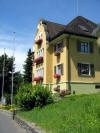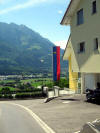Liechtnestien
Our trip through Liechtenstein was brief and non eventful, but here are a few facts;
1990 was a special year for Liechtenstein: The
Principality joined the United
Nations. This event marked a further milestone in the nation's sovereignty.
Liechtenstein has been independent since the year 1806. Its autonomous
sovereignty and neutrality have never been disputed - not even during the two
world wars. Liechtenstein numbers among the few states which never recognized
the Munich Agreement of 1938 between Germany, Italy, France and the United
Kingdom under which parts of Czechoslovakia were annexed by the German Reich.
Liechtenstein is party to numerous international agreements as well as a member of major international and European organizations and institutions. Apart from its membership of the United Nations (since 1990), a number of its special organizations as well as the statutes of the International Court of Justice (since 1950), Liechtenstein is also a member of the Council of Europe (since 1978), EFTA (associated member since 1959; full membership since 1991), the WTO (since 1995), the European Patent Organization (since 1980), the European Bank for Reconstruction and Development (since 1991) as well as the OSCE (formerly CSCE, since 1975). On 1 May 1995, Liechtenstein became a member of the European Economic Area (EEA) comprising now 25 EU member states as well as Iceland, Liechtenstein and Norway.
Covering an area of just 160 km², Liechtenstein is one of the world's smallest independent states. Two-thirds of the country are mountainous, with one-third developed areas. Despite its small size, Liechtenstein is still big enough to be geographically subdivided into the Oberland containing the former earldom of Vaduz and the Unterland on what used to be the Schellenberg dominion.
Liechtenstein has a population of approx. 33,000 of
which over a third are foreign nationals. Demographically, these are made up
notably of Swiss and Austrian nationals as well as nationals of other states,
including a large number of German nationals. Official language is German, with
an Alemannic dialect used in everyday life. Around 80% of the population are
Roman Catholic, and around 7%
Protestant.
According to the country's constitution, Liechtenstein is a "constitutional hereditary monarchy based on democratic and parliamentary rule." State power is invested in the prince and the people. Prince Hans-Adam II von und zu Liechtenstein has been head of state of the Principality's eleven local government districts since 13 November 1989. His father, Prince Franz Josef II, appointed him deputy as early as 26 August 1984 and entrusted him with the matters of government. To this day, the royal family resides in the castle overlooking Vaduz (around 5,000 inhabitants).
Liechtenstein's parliament, the Landtag, is elected directly by the people every four years. The Unterland parliamentary constituency provides 10 members, the Oberland constituency 15. During the elections in February 2001, 13 members of the Fortschrittliche Bürgerpartei (FBP - Progressive Citizens' Party), 11 members of the Vaterländische Union (VU - Fatherland Union) and one member of the Freie Liste (FL - Free List) gained a seat. The government is made up of the head of government and four government ministers.
Liechtenstein has a flourishing economy and, in terms of per-capita income (4.35 billion Swiss francs GDP), ranks among the world's richest countries. At 2.2%, the country's unemployment rate is exceptionally low. 53.4% of the approx. 29,000 jobs (including around 13,000 commuters) are in the service sector, 44.8% in industry and commerce and 1.3% in forestry and agriculture. The industry, services and financial services sectors play a key economic role for the country; the share accounted for by industry is often underestimated. Liechtenstein's chief export markets are Europe, the USA and the Far East. Tourism is also an important sector, whereas compared with other countries agriculture is of only moderate significance.
Following the Second World War, Liechtenstein evolved into a major international financial hub. The country's close ties with Switzerland - Liechtenstein and Switzerland have shared customs and monetary union since 1924 - are of great importance. Liechtenstein's official currency is the Swiss franc.




















